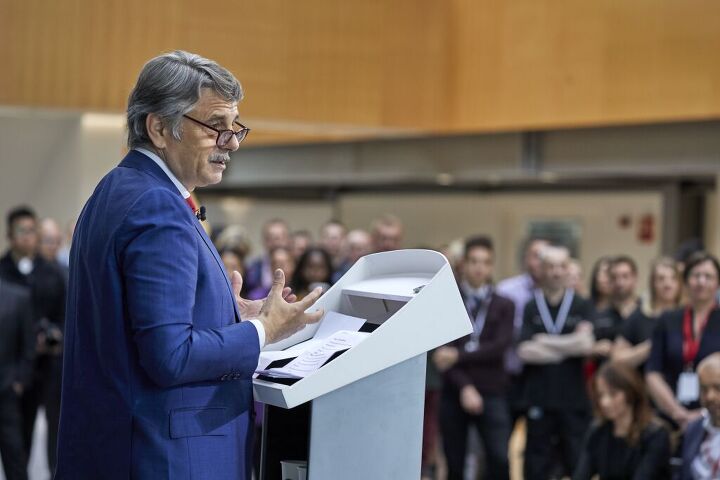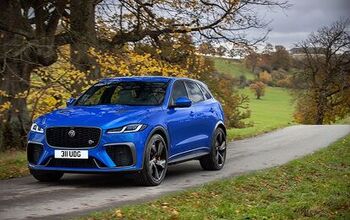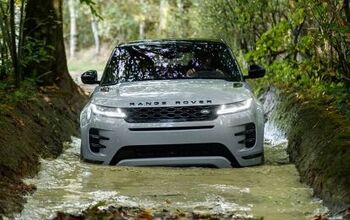Jaguar Land Rover CEO Stepping Down in September

Ralf Speth, the longtime CEO of Jaguar Land Rover (JLR), is stepping down. Parent company Tata Motors confirmed the move, saying Speth would continue serving as a non-executive vice chairman on the board holding company and advisor to JLR.
At 64, Speth is easing into retirement after having led the company for the last ten years. He’s scheduled to leave his post in September, having spent the brunt of his tenure expanding the company’s global footprint.
Natarajan Chandrasekaran, chairman of the Tata Sons holding company, said a search committee has been formed will work closely with him to identify a suitable successor in the coming months. But news of Speth’s prospective replacement followed closely after the retirement announcement.
The Financial Times named Hanne Sørensen as the probable candidate. She joined Tata Motors in 2018, after working as the CEO of Maersk Tankers and Damco.
Speth joined BMW in 1980, spending 20 years with the automaker as an engineer before joining Ford Motor Company’s Premier Automotive Group back when it still owned Jaguar and Land Rover. The subsequent sale of those brands to Tata Motors led to his becoming CEO of JLR in February of 2010. Five years later, he was appointed as an honorary Knight Commander of the Order of the British Empire for his services to the UK auto industry.
“I feel very honoured to have worked with so many dedicated and creative people, both inside and outside of Jaguar Land Rover. We have elevated Jaguar and Land Rover. I want to say thank you for all their support and commitment,” Septh (officially, Prof Sir Ralf Speth) said in a statement. “We offer our customers multi-award-winning products and will continue to surprise with the best pipeline of new, innovative products we have ever had … Personally, I am looking forward to new and exciting challenges.”
One of the largest will be maintaining the foundation already in place. JLR picked up a lot of steam throughout the 2010s. However, the auto market has since cooled off, and JLR has had to cope with losses in its home market of Europe and presumed growth markets like China. It recently announced £1.1 billion ($1.44 USD) in cost-saving measures on top of the £2.9 billion in cuts already made. This is all being done in an effort to improve its financial foundation and remain profitable — which it has for the last two quarters. Despite fewer car sales overall, pre-tax profits for the three months leading up to 2020 sat at £318 million. The same financial period for the previous year resulted in a loss of £273 million.
Other headaches involve costly electric vehicle development programs. Jaguar currently has the I-Pace, but it’s not a big seller. Meanwhile, the rest of the company has been slow to move on EVs — prompting a battery development partnership with BMW. Europe’s turn away from diesel also helped to tamp down sales. JLR’s retail volume dropped 6 percent in 2019, resulting in the global delivery of 557,706 vehicles.
[Image: Jaguar Land Rover]

A staunch consumer advocate tracking industry trends and regulation. Before joining TTAC, Matt spent a decade working for marketing and research firms based in NYC. Clients included several of the world’s largest automakers, global tire brands, and aftermarket part suppliers. Dissatisfied with the corporate world and resentful of having to wear suits everyday, he pivoted to writing about cars. Since then, that man has become an ardent supporter of the right-to-repair movement, been interviewed on the auto industry by national radio broadcasts, driven more rental cars than anyone ever should, participated in amateur rallying events, and received the requisite minimum training as sanctioned by the SCCA. Handy with a wrench, Matt grew up surrounded by Detroit auto workers and managed to get a pizza delivery job before he was legally eligible. He later found himself driving box trucks through Manhattan, guaranteeing future sympathy for actual truckers. He continues to conduct research pertaining to the automotive sector as an independent contractor and has since moved back to his native Michigan, closer to where the cars are born. A contrarian, Matt claims to prefer understeer — stating that front and all-wheel drive vehicles cater best to his driving style.
More by Matt Posky
Latest Car Reviews
Read moreLatest Product Reviews
Read moreRecent Comments
- Lou_BC Actuality a very reasonable question.
- Lou_BC Peak rocket esthetic in those taillights (last photo)
- Lou_BC A pickup for most people would be a safe used car bet. Hard use/ abuse is relatively easy to spot and most people do not come close to using their full capabilities.
- Lorenzo People don't want EVs, they want inexpensive vehicles. EVs are not that. To paraphrase the philosopher Yogi Berra: If people don't wanna buy 'em, how you gonna stop 'em?
- Ras815 Ok, you weren't kidding. That rear pillar window trick is freakin' awesome. Even in 2024.


































Comments
Join the conversation